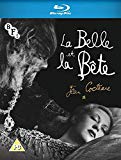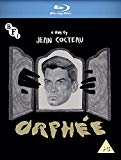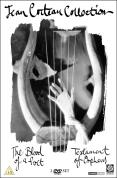 La Belle et la Bete (Blu-ray) | Blu Ray | (06/08/2018)
from £18.75
| Saving you £N/A (N/A%)
| RRP
La Belle et la Bete (Blu-ray) | Blu Ray | (06/08/2018)
from £18.75
| Saving you £N/A (N/A%)
| RRP La Belle et la bête is a landmark feat of cinematic fantasy in which master filmmaker Jean Cocteau conjures spectacular visions of enchantment, desire and death that have never been equalled. Josette Day is luminous yet feisty as Beauty, and Jean Marais gives one of his best performances as the Beast, at once brutal and gentle, rapacious and vulnerable, shamed and repelled by his own bloodlust. Henri Alekan's subtle black and white cinematography combine with Christian Bérard's masterly costumes and set designs to create a magical piece of cinema, a children's fairy tale refashioned into a stylised and highly sophisticated dream. The BFI is proud to present this world cinema classic in High Definition for the first time in the UK. Extras: Presented in High Definition Audio commentary with cultural historian Sir Christopher Frayling Fully illustrated booklet with new writing on the film and full film credits
![Orphee [1950]](/pictures/1085738.jpg) Orphee | DVD | (27/10/2008)
from £18.98
| Saving you £3.00 (17.66%)
| RRP
Orphee | DVD | (27/10/2008)
from £18.98
| Saving you £3.00 (17.66%)
| RRP Cocteau's fantastical updating of the Orpheus legend is cinematic poetry. Unforgettable and profoundly influential.
 Orphée (Blu-ray) | Blu Ray | (28/01/2019)
from £18.75
| Saving you £N/A (N/A%)
| RRP
Orphée (Blu-ray) | Blu Ray | (28/01/2019)
from £18.75
| Saving you £N/A (N/A%)
| RRP This magical re-telling of the Orpheus myth turns the lyre-playing singer of Greek legend into a famous left-bank poet in post-war Paris. Fallen out of favour and lost for poetic inspiration, Orphée becomes obsessed with a mysterious black-clad princess who first claims the life of a rival poet, and then Eurydice, his wife. With its unforgettable imagery - the dissolving mirror through which characters pass into the next world, the leather-clad, death-dealing motorcyclists, and Cocteau's magical special effects, Orphée is a work of haunting beauty that follows the poetic logic of a dream . This new photochemical and 2K restoration of the film from the original nitrate negative was carried out by SNC (Groupe M6) with the support of the Archives françaises du film. Special Features: Audio commentary by Roland-François Lack Souvenirs de tournage de Jean Pierre Mocky (16 mins): actor Jean Mocky looks back on Orphée Jean Cocteau raconté par Pierre Bergé et Dominique Marny (36 mins) Jean Cocteau and His Tricks (2008, 14 mins): assistant director Claude Pinoteau discusses the special effects Jean Cocteau used in his films La villa Santo-Sospir (1951, 38 mins): a short film directed by Jean Cocteau about the villa Santo-Sospir, on Côte d'Azur, which he decorated, and his home in Villefranche-sur-mer The Queer Family Tree - Reflections on Jean Cocteau (2018, 15 mins): A newly recorded interview with director John Maybury (Love is the Devil, The Edge of Love) Theatrical trailer 2018 re-release trailer Reversible sleeve with new artwork by Edward Kinsella Fully illustrated booklet with an essay by Ginette Vincendeau, an interview with Jean Cocteau from 1950, and full film credits
![La Belle Et La Bete [1946]](/pictures/1012959.jpg) La Belle Et La Bete | DVD | (19/11/2001)
from £N/A
| Saving you £N/A (N/A%)
| RRP
La Belle Et La Bete | DVD | (19/11/2001)
from £N/A
| Saving you £N/A (N/A%)
| RRP La Belle et La Bete is one of the all-time great movie fantasies, and one of the most gorgeous pictures ever made. It was the first feature film by French director Jean Cocteau, a writer, poet and painter with ties to the surrealists. (In fact, his first film, The Blood of a Poet, was delayed after the scandal caused by L'Age D'Or, made by his fellow surrealists Luis Buñuel and Salvador Dali.) The haunting, surreal visuals (candelabra made of human hands, for example) and a sensitive performance by Jean Marais as the Beast imbue the film with an indelible, mythical power. --Jim Emerson, Amazon.com
![La Belle Et La Bete [1946]](/pictures/1085735.jpg) La Belle Et La Bete | DVD | (25/08/2008)
from £18.75
| Saving you £1.24 (6.61%)
| RRP
La Belle Et La Bete | DVD | (25/08/2008)
from £18.75
| Saving you £1.24 (6.61%)
| RRP Cocteau's surrealist vision of the classic fairytale moving from the sparse settings of Belle's village home to the enchanted castle of the Beast.
 Jean Cocteau Collection | DVD | (30/04/2007)
from £13.79
| Saving you £6.20 (44.96%)
| RRP
Jean Cocteau Collection | DVD | (30/04/2007)
from £13.79
| Saving you £6.20 (44.96%)
| RRP This stunning Jean Cocteau box set features Le Sang D'Un Poete (aka: The Blood Of The Poet) and Testament D'Orphee (aka: Testament Of Orpheus). Also an artist poet playwright and novelist Jean Cocteau is widely regarded as one of the most pioneering and important avant-garde directors cinema has produced. His debut Le Sang D'Un Poete and swansong La Testament D'Orphee are released here together in a boxset for the first time in the UK; made 30 years apart they bookend his filmic career and are both masterpieces of the avant-garde movement of which he was at the heart. Cocteau released 12 films in his lifetime including the award-winning La Belle Et La Bete (1946) perhaps his most accessible (and therefore well-known) work. Though often described as a poet first and foremost Cocteau's films were also infused with the phantasmorgorical surrealist imagery and rich symbolism characteristic of all his work. Le Sang D'un Poete (1930): In an artist's studio an unfinished statue comes to life. The lips of its androgynous face move pressing a kiss to the artist's hand. At the statue's demand he plunges it into a mirror. Le Testament D'orphee (1960): Jean Cocteau gave the cinema a truly abstract piece of work as his swansong in which the mind of a poet (played by Cocteau himself) takes control of reality twisting and re-moulding it until it bears not the slightest resemblance to reality as we know it in real life.
![Jean Cocteau - Le Sang D'Un Poete [DVD] [2019]](/pictures/1149787.jpg) Jean Cocteau - Le Sang D'Un Poete | DVD | (05/08/2019)
from £11.89
| Saving you £N/A (N/A%)
| RRP
Jean Cocteau - Le Sang D'Un Poete | DVD | (05/08/2019)
from £11.89
| Saving you £N/A (N/A%)
| RRP In an artist's studio, an unfinished statue comes to life. The lips of its androgynous face move, pressing a kiss to the artist's hand. At the statue's demand, he plunges it into a mirror.
![Jean Cocteau - Le Sang D'Un Poete [Blu-ray] [2019]](/pictures/1149817.jpg) Jean Cocteau - Le Sang D'Un Poete | Blu Ray | (05/08/2019)
from £11.99
| Saving you £N/A (N/A%)
| RRP
Jean Cocteau - Le Sang D'Un Poete | Blu Ray | (05/08/2019)
from £11.99
| Saving you £N/A (N/A%)
| RRP In an artist's studio, an unfinished statue comes to life. The lips of its androgynous face move, pressing a kiss to the artist's hand. At the statue's demand, he plunges it into a mirror.
![Orphee [1950]](/pictures/1011647.jpg) Orphee | DVD | (30/08/2004)
from £N/A
| Saving you £N/A (N/A%)
| RRP
Orphee | DVD | (30/08/2004)
from £N/A
| Saving you £N/A (N/A%)
| RRP A retelling of the Greek myth set in post-war Paris. When a famous poet falls in love with the strange Princess Death he is compelled to follow her anywhere in search of inspiration - even into the underworld.
 Blood Of A Poet / Testament Of Orpheus | DVD | (04/04/2005)
from £N/A
| Saving you £N/A (N/A%)
| RRP
Blood Of A Poet / Testament Of Orpheus | DVD | (04/04/2005)
from £N/A
| Saving you £N/A (N/A%)
| RRP 
Please wait. Loading...
This site uses cookies.
More details in our privacy policy